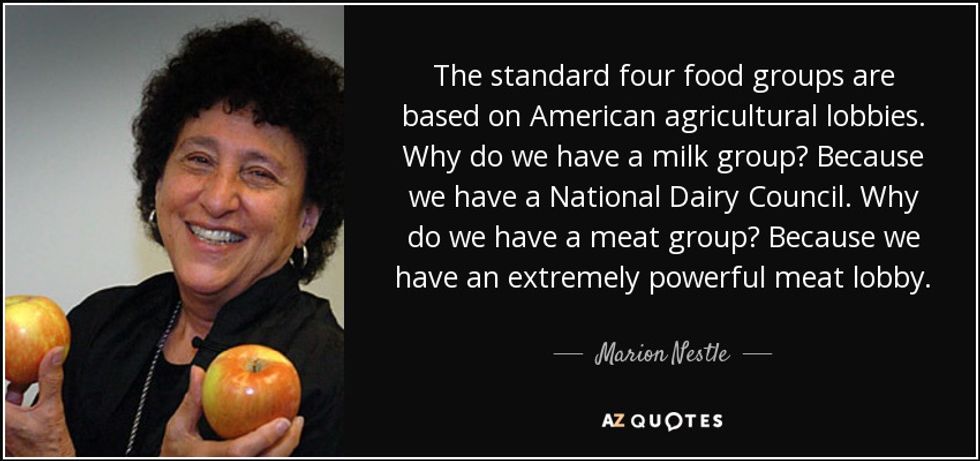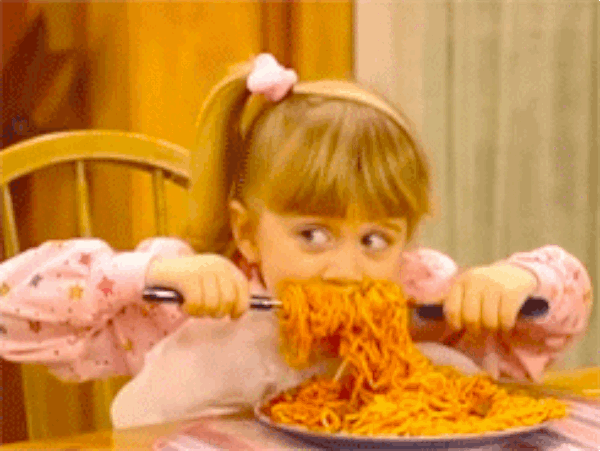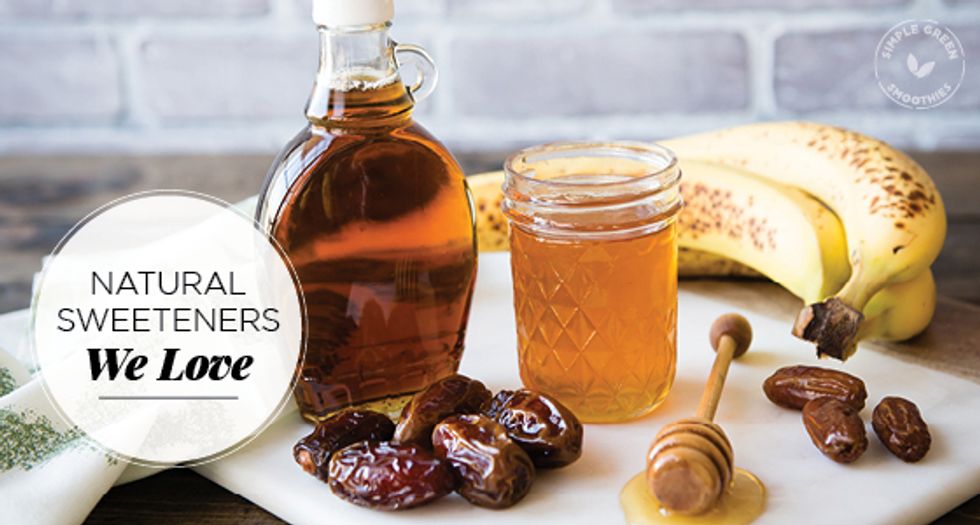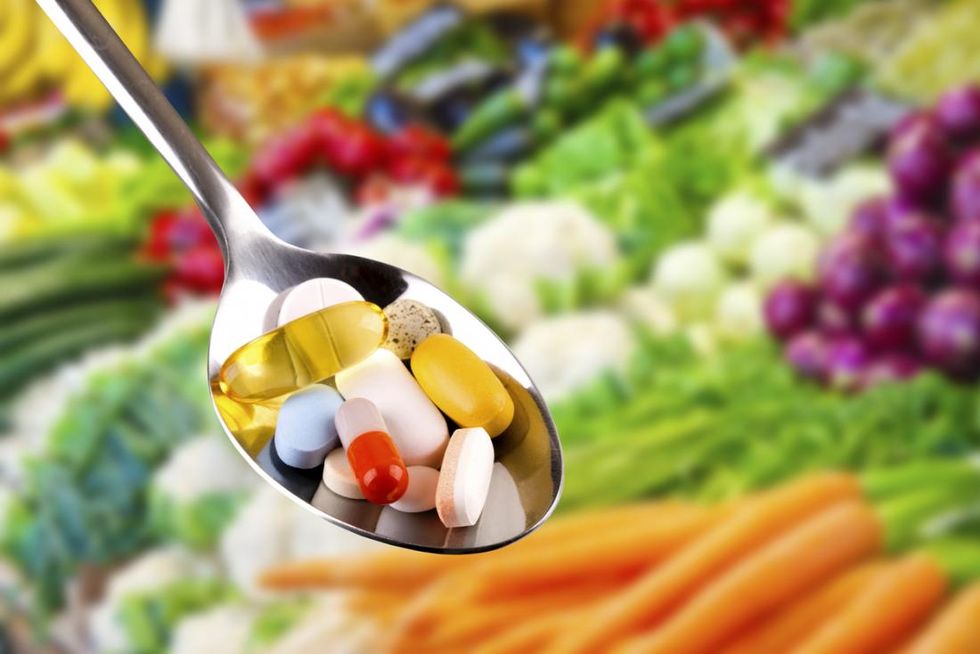The health, fitness and diet industries along with our modern day social, political, cultural and economic climates have made the choice of "what to eat" seemingly impossible for many. Many of us have seemingly contradictory moral and personal wants, needs, and goals to balance when it comes to food; we want to take care of our own health, the health of our children, the health of the environment, the health of those who produce our food, etc. Basically, we just want to do what's best for ourselves and others. But every year we hear a different message about what's really "best" and "worst" for us, so what are we to do?
This is the exact question Marion Nestle addresses in her book, What to Eat. In this book, she walks the reader through every section of the grocery store and discusses the "goods" and "bads" of each type of food. She takes you through the political, economic, and social implications and discusses personal health as well as health for the planet and others living on it. Below is a brief, comprehensive list summarizing her major findings and conclusions.
1. Produce
People who eat five or more servings of produce a day have half the cancer risk of people who don't! Overall, people with diets based on fruits, vegetables, and grains have significantly lower rates of heart disease and cancer.
For the best option for your individual health, the planet, and farmers, Nestle suggests buying organic and locally grown produce. If this is inaccessible, then of course buy what you are able (conventional fruit is better than no fruit). When arriving at this decision, Nestle took into account GMOs, chemical treatment on farms, sewage sludge, irradiation, energy efficiency, soil degradation, pollution, and workers' rights.
2. Dairy
Most important here is to choose non-fat dairy options. Choose organic and know the producers if possible. Plant substitutes are preferable. When it comes to butter, buy it real and use it sparingly rather than resorting to trans-fat laden "I Can't Believe It's Not Butter".
Up to 75% of the world's adults cannot digest dairy foods, yet most people have fallen for the "calcium myth". The truth is we get plenty of calcium from nondairy foods, and the other health concerns that come with dairy products make it a poor choice as a primary calcium source. Nestle asserts that dairy is best avoided in large amounts because of its saturated fat and cholesterol content. Dairy should be considered a treat, not a dietary staple.
3. Meat

Vegetarians are demonstrably healthier than meat eaters, and the planet and political climate would be better off without corporate giants in the meat industry. For these reasons, Nestle advises everyone to "be vegetarian, or near vegetarian". If you are to purchase meat, search for organic, near organic, or natural meats. If you must choose meat, choose lean, low-fat, or fat-free cuts. As you begin to eat less of all foods from animal sources, limit your egg intake to just one per day because of high cholesterol contents. Choose organic and local when possible, but whether it's white or brown does not matter. Eat fish never or rarely because of Mercury and PCB contents dangerous to human health and fish farming practices dangerous to the environment. Don't worry, you can get your omega3s from other sources. If you must eat fish, follow seafood guides.
4. Processed and frozen foods

Foods that have undergone pasteurization, cooking, freezing, drying, or canning are considered minimally processed. Most nutrients are even preserved through these processes. Avoid ultra-processed foods where the product barely resembles its original ingredients. These include starchy snacks, dessert-like cereals, and foods high in added sugars, sodiums, and "cheap" calories (foods that come with high calories but low nutrients) like soft drinks, juice drinks, desserts, and packaged snack foods. Except for on special occasions, of course.
Contrary to popular belief, Nestle maintains that it's better to watch your portion sizes when eating "junk" food than to choose "slightly better junk" as a regular snack (i.e. potato chips vs pretzels, etc). Your diet doesn't have to be free of processed foods, rather you should just think of these foods as "once in a while" foods.
5. Carbs

6. Drinks
Juices from concentrate, pulp-free juices, and sports drinks are practically sugar water and should be treated as "once in a while" treats. Neither bottled nor tap water are well regulated, which is an issue of politics, but choose tap water with a filter if you're concerned about personal or environmental health. When it comes to coffee and tea, watch out for milk and sugar because they can quickly convert drinks into desserts. Additionally, when seriously considered, coffee and tea are wildly problematic for the environment and the producers of the products. Choose organic, fair trade, shade grown, or rainforest alliance labels to minimize your impact.
7. Vitamins, supplements, and artificial sweeteners.
Be uncomfortable with "0 calories" and artificial anything when it comes to food. Sugar is not the devil, but if you want a sugar replacement then be sure to check out other natural sweetening options rather than artificial sweeteners like Splenda.
Remember that no one food can be the cure for anything (rather eating a variety of nutritional foods ensures good health), so be wary of food labels that claim otherwise. If you eat a variety of foods and are otherwise healthy, the chances you will be deficient in any vitamin or mineral is small. There is no problem with taking supplements, but know that the supplement industry is widely unregulated. Supplements may contain toxic chemicals or pesticides and may not have the amounts of vitamins they claim to have.
Marion Nestle maintains that it's better to pay attention to your overall dietary pattern than to worry whether any single food is better for you than another. She advises everyone to eat a variety of foods because all foods truly do fit in a healthful diet and eating a wide variety of foods is the best way to give your body what it needs. According to Marion Nestle, if health is your goal, then you should focus on eating less, moving more, and eating mostly plants. By this, she means to balance an active lifestyle with a diet consisting of "normal" sized portions limited in fats and sugars. Above all, Nestle tells us to stop worrying about what we eat. If we stop worrying, we will have a much more satisfying and pleasurable relationship with the food we eat! Pick up her book today to learn more.























